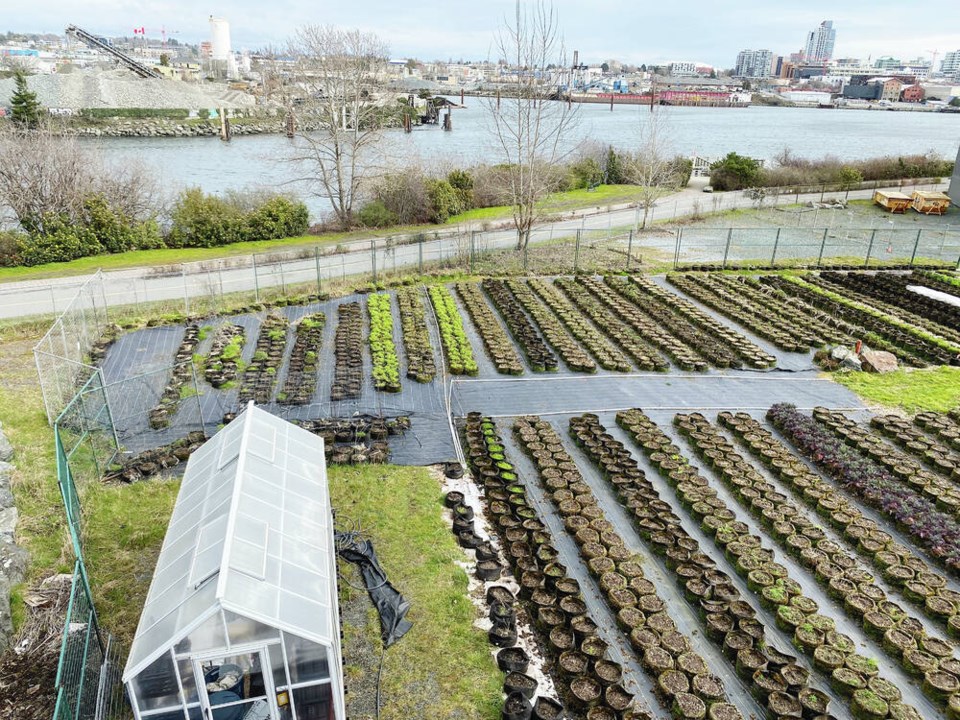New operator for urban farm
A Victoria-based charity that promotes urban agriculture and access to local sustainably grown food — is taking over Topsoil, the urban farm at the foot of the Bay Street Bridge in Vic West.
The farm at 395 Harbour Rd., just off the Galloping Goose Trail in the Dockside Green area, grows fresh produce for its on-site market, weekly veggie-box program and local restaurants.
Under FED Urban Agriculture’s leadership, staff will be retained and operations will continue in largely the same way, with added opportunities for education, community engagement, and on-site research and development in sustainable food production, it said. All proceeds from farm sales will go toward FED’s charitable programming.
“I couldn’t be happier to be passing the farm on to such an amazing organization,” said Chris Hildreth, founder and CEO of Topsoil. “FED will allow the farm to continue to thrive in this new chapter of increasing local food production in Victoria.”
FED’s takeover comes after five years of working in partnership with Topsoil.
The collaboration began in 2020 with My FED Farm, a project that delivered food-growing garden kits to vulnerable populations in Greater Victoria.
Since then, the program has added about 23,000 pounds of annual food-growing capacity in the community, engaging 32 partner organizations and seven Indigenous community organizations in addition to hundreds of individual households.
“We’re honoured that Topsoil has trusted us with this opportunity and can’t wait to get to know our new community as we dive into farm operations,” said Brianna Stewart, FED’s program manager. “We have big dreams for the farm in the coming years and look forward to making urban farming more accessible to young farmers as we increase food security in the city.”
More information is at get-fed.ca.
Victoria Airport hosts period-care initiative
Victoria Airport Authority is partnering with a women-led company to provide free period-care product dispensers in pre- and post-security washrooms at Victoria International Airport.
“We are committed to creating a workplace and travel environment that prioritizes the well-being and dignity of all individuals,” said Elizabeth Brown, airport authority president and CEO. “The installation of period-care product dispensers reflects our dedication to supporting menstrual health and promoting inclusivity within our community.”
YYJ partnered with Victoria-based brand joni, a provider of biodegradable and organic period-care products, for the initiative. Brown said by choosing joni, the airport emphasizes its commitment to environmental sustainability, and supporting women-led companies.
Linda Biggs, CEO and co-founder of joni, said the free commercial dispensers create more equitable spaces for workers and travellers. “As a woman-led business, we appreciate the partnership and YYJ’s commitment to sustainability and accessibility when it comes to menstrual care solutions in public washrooms,” she said.
YYJ is the 11th busiest airport in sa╣·╝╩┤½├Į based on passenger numbers.
Safety conference expands to Victoria
Close to 100 attendees from Island breweries, fisheries, cheese makers and metal manufacturers came together for a one-day trade show and conference focused on health and safety in the manufacturing sector this month.
Manufacturing Safety Alliance of sa╣·╝╩┤½├Į typically holds its conferences in the Lower Mainland and expanded into the Interior last year, and the Island this year.
Lisa McGuire, the organization’s chief executive officer, said this year’s conference focused on looking at how health and safety programs need to adapt to climate change and the importance of a safety culture in the workplace.
Speakers at the inaugural Make It Safe Vancouver Island conference at the Coast Victoria Hotel & Marina included Danny Seeton, Vancouver Island Brewing operations manager, and David Fagan, sa╣·╝╩┤½├Į Ferries safety, health and environment executive director.
McGuire said there’s a psychological component to safety that companies are just now beginning to address. “We need to ensure that we have support mechanisms around mental-health issues … it’s not just the physical risks. It’s also the psycho-social risks.”



